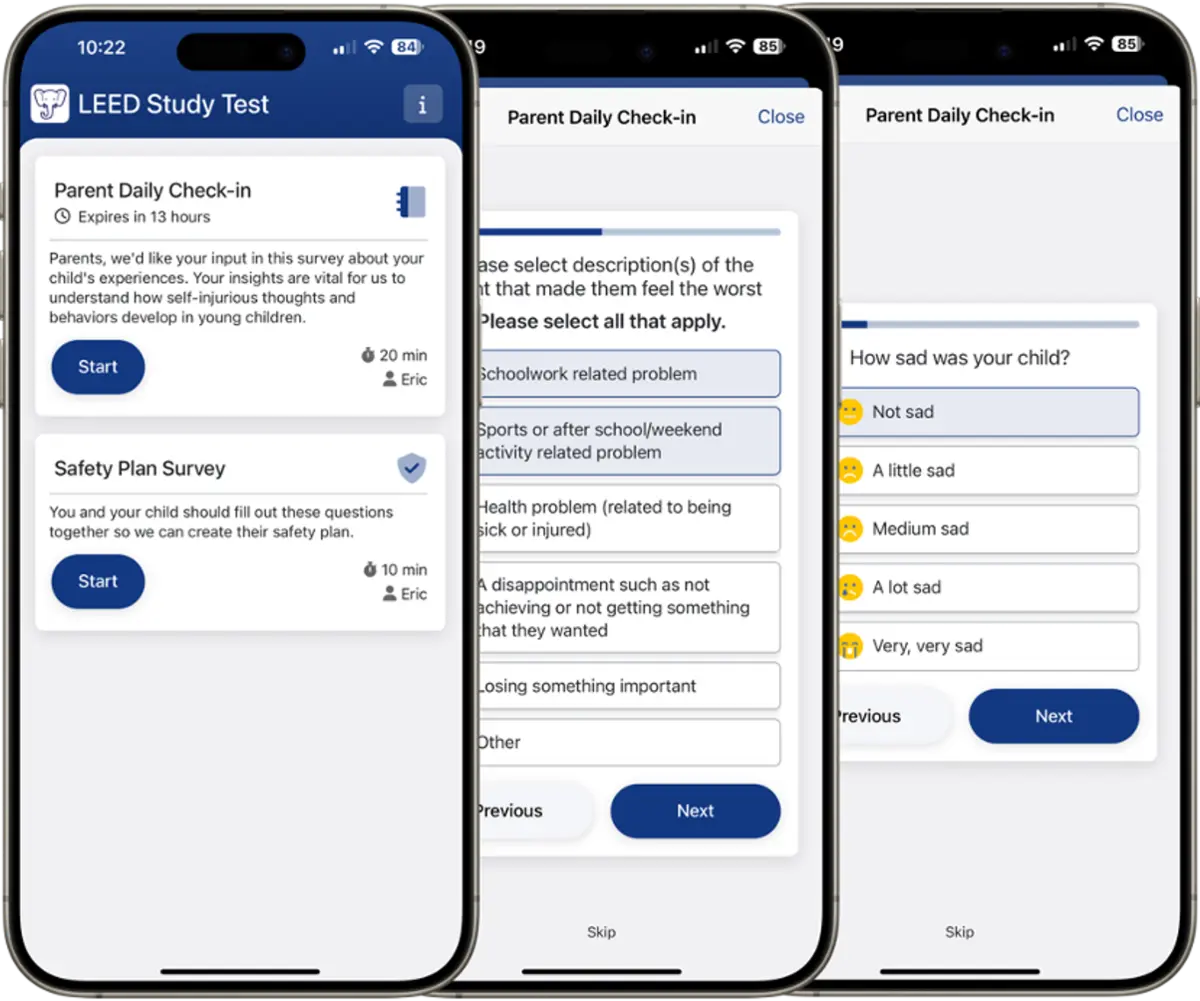Objective
To address and better understand mental health in youth, using RTI technologies.
Approach
We employ advanced technologies, including RTI StudySense™ and WRAP®, to facilitate real-time data collection and deliver personalized interventions tailored to the unique needs of young participants.
Impact
By filling critical gaps in mental health research and providing accessible, responsive support, these initiatives aim to better understand emotional well-being and resilience among vulnerable youth.
Understanding the Need for Youth Mental Health Innovation
Youth mental health issues are a pressing concern that has garnered increased attention in recent years. With the rate of anxiety, depression, and self-harm behaviors rising over the past 15 years among children and adolescents, it is crucial to develop innovative interventions tailored to youth. Generating research on this youthful population comes with its own challenges.
To fill the gaps in youth mental health research, RTI teams are leveraging advanced technology and adaptive methodologies to meaningfully engage participants. The Life Experiences and Emotional Development (LEED) and SideKick studies are two examples focused on young children and adolescents, enhancing emotional well-being during critical developmental stages.
Both LEED and SideKick utilize digital products developed at RTI, RTI StudySense™ and WRAP®, to offer innovative approaches to survey and wearables data collection and participant engagement. The RTI StudySense™ mobile application provides accessibility and convenience, allowing youth to engage with surveys on their own terms. Features such as interactive surveys, visual prompts, and customizable notifications help maintain participant engagement, while multimedia elements like audio options and emojis cater to varying literacy levels, making the tools more approachable for younger users. These studies emphasize the importance of better understanding mental health experiences among youth.
Addressing Youth Mental Health in Our Research Projects
LEED Study
The LEED study is a partnership between RTI and UNC Chapel Hill. It seeks to understand the emergence of self-injurious thoughts and behaviors among children ages five to nine. Such thoughts and behaviors from this age group can be a predictor of poor functional and psychological developmental trajectories that can be persistent, recurrent, and worsening in adolescence and adulthood. This study addresses an important gap in existing youth suicide research, which has largely excluded younger children.
The LEED survey has enrolled over 135 children and their caregivers to date and intends to enroll up to 300 youth and their caregivers to engage with over two years. This study employs a multi-modal assessment strategy, including clinical interviews, physiological measurements, and daily diary entries to capture variations in emotional responses and behaviors in real time. By exploring the connections between threat exposure history and the emergence of self-injurious thoughts and behaviors, as well as the roles of emotional reactivity and reactive aggression as predictors of these behaviors, LEED seeks to lay the foundation for effective preventive strategies.

The LEED study utilizes the RTI StudySense™ platform to provide a unique experience for children and their parents to participate remotely. This method saves time for both families and researchers, while still allowing daily data collection. Parents and children are provided with separate surveys and personalized reminders, and they have the option to respond through recorded audio or photo submissions. Content is delivered in shorter, more engaging segments and includes visual or audio feedback elements designed to appeal to younger participants with limited or varied reading skills. Importantly, RTI StudySense™ can trigger real-time safety alerts for the research team if participants respond with suicidal or self-harm thoughts, ensuring timely interventions.
RTI StudySense™ is a comprehensive digital platform developed by RTI and designed to simplify survey research. It provides simplified participant onboarding, consent management, survey delivery, on-demand compensation, and data collection. Learn more here.
RTI StudySense™ has made it possible for LEED to be the first study to deliver daily electronic surveys directly to children as young as 5 about their self-injurious thoughts and behaviors. This methodological innovation in the field will advance knowledge of child risk for self-injurious thoughts and behaviors and other mental health outcomes in young children. – Caroline Oppenheimer, PhD, Suicide Prevention Research Scientist at RTI.
SideKick Study
Another ongoing youth mental health project, called SideKick, is a partnership between RTI, University of North Carolina at Chapel Hill, and University of Washington. It incorporates a just-in-time adaptive intervention that aims to improve sleep and physical activity, two critical factors correlated with depression, among teenagers aged 13 to 18, who are being treated for depression. With over three million adolescents diagnosed with major depressive disorder annually, many do not receive the necessary mental health care. By leveraging wearable technology and real-time data collection, SideKick provides personalized and timely support at crucial moments based on participants' daily needs.
Phase I of SideKick includes 35 participants living in Tacoma, Washington. For one month, participants track their sleep and exercise data using a wearable device. They also complete two surveys daily about sleep from the previous night and physical activities performed throughout the day. Data from both the survey responses and wearable sensors are used to deliver tailored prompts. This timely intervention approach can enhance engagement with established evidence-based practices and also improve sleep and physical activity outcomes, leading to improved mood and overall psychosocial functioning.

Similar to the LEED study, SideKick implements the RTI StudySense™ platform to deliver tailored engagement experiences, with daily notifications and prompts designed to increase adherence. For example, a report of poor sleep using RTI StudySense™ along with data collected from a wearable using WRAP®, prompts a notification to a participant encouraging them to address problems that affect sleep and adapt routines that increase healthy sleeping patterns. Safety protocols were also established to address vulnerable emotional states, triggering alerts for surveyors and emergency contacts if self-harm ideation is indicated.
WRAP® is a platform developed by RTI for collecting, storing, and analyzing data through wearable technologies like smartwatches, fitness trackers, smart glasses, etc. Learn more here.
RTI StudySense’s ability to integrate information from wearable devices and twice daily surveys allows us to personalize an evidence-based intervention for teenagers in a way that has not been previously possible. This innovative platform enables us to capitalize on teenagers’ preference for digitally enhanced interventions with their mental health team.” – Adam Bryant Miller, PhD, Associate Professor of Psychiatry at the University of North Carolina at Chapel Hill.
Paving the Way for Innovative Youth Mental Health Interventions
LEED and SideKick represent significant strides in addressing the critical mental health needs of children and adolescents. These studies are prime examples of how the engaging technologies that have led to personalized digital experiences in other areas can also be applied to research. As LEED and SideKick progress, they will pave the way for scalable interventions that can meet the mental health challenges faced by vulnerable youth populations, fostering a healthier and more resilient future for the next generation.
Partner With Us
Want to know more about RTI StudySense™ or WRAP®? Please contact us to learn more about these products.




